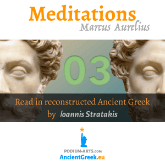• Meditations 03 •
• Marcus Aurelius Antoninus •

Duration: 23 mins 29 sec
Unabridged
Recorded: 2023
Price : $/€ 15 (audiobook) - $/€ 25 (videobook)
About the Meditations series
The "Meditations" (Greek title: Τῶν εἰς Ἑαυτόν) is a series of personal reflections and philosophical musings written by Marcus Aurelius, Roman emperor and Stoic philosopher. The book is considered one of the greatest works of Stoic literature and provides insight into the emperor's personal beliefs and values. The reflections were written over a period of several years, primarily while Marcus was on military campaign, and cover a range of topics including death, the nature of existence, and the pursuit of wisdom and virtue.
The third book underscores the ephemeral nature of life and advocates for a stoic and philosophical approach to existence. It prompts reflection on the dwindling time left in one's life, emphasizing the uncertainty of mental faculties in old age. The author suggests a sense of urgency not just due to the proximity of death but also because cognitive abilities diminish with time.
The Stoic philosophy is apparent throughout, urging individuals to find pleasure in simple, natural phenomena and appreciate the beauty in unexpected places. It encourages a virtuous life marked by justice, truth, temperance, and fortitude. Historical examples, such as Hippocrates, Alexander, and others, serve as poignant reminders of life's brevity, regardless of one's achievements.
The third book concludes with a call to live in accordance with reason, work diligently, and appreciate the present moment. It stresses the importance of self-reflection, avoiding distractions, negative thoughts, and undue concerns about others. The concept of defining and understanding each encountered situation, maintaining a connection between the divine and human aspects, and embracing contentment regardless of external circumstances is central to the Stoic principles presented. Overall, the text encourages individuals to lead a purposeful, virtuous life, appreciating the present while acknowledging the transient nature of existence.
In the video you can follow the opening text of "Meditations" book 03. Alternatively, those who prefer the audiobook edition can find many places online, like Perseus Library or an English translation by George Long.
About the digital formats
 Both the audio recording and the videobook contain the complete, unabridged Ancient Greek text of the 3rd book of the "Meditations" of Marcus Aurelius. After purchase you will be able to download the relevant mp3 audiobook or m4v videobook file (or both) by clicking on the relevant green buttons. Translated caption in English; other languages on request.
Both the audio recording and the videobook contain the complete, unabridged Ancient Greek text of the 3rd book of the "Meditations" of Marcus Aurelius. After purchase you will be able to download the relevant mp3 audiobook or m4v videobook file (or both) by clicking on the relevant green buttons. Translated caption in English; other languages on request.
You can listen to the first chapter of “the Meditations, book 03”, an audio sample of the present recording. Please, click on the play-button bellow and, if you wish, follow the Ancient Greek text lower on the page, or alternatively watch the video. Thank you!
ΤΩΝ ΕΙΣ ΕΑΥΤΟΝ 03
α΄. Οὐχὶ τοῦτο μόνον δεῖ λογίζεσθαι, ὅτι καθ᾽ ἑκάστην ἡμέραν ἀπαναλίσκεται ὁ βίος καὶ μέρος ἔλαττον αὐτοῦ καταλείπεται, ἀλλὰ κἀκεῖνο λογιστέον, ὅτι, εἰ ἐπὶ πλέον βιῴη τις, ἐκεῖνό γε ἄδηλον, εἰ ἐξαρκέσει ὁμοία αὖθις ἡ διάνοια πρὸς τὴν σύνεσιν τῶν πραγμάτων καὶ τῆς θεωρίας τῆς συντεινούσης εἰς τὴν ἐμπειρίαν τῶν τε θείων καὶ τῶν ἀνθρωπείων. ἐὰν γὰρ παραληρεῖν ἄρξηται, τὸ μὲν διαπνεῖσθαι καὶ τρέφεσθαι καὶ φαντάζεσθαι καὶ ὁρμᾶν καὶ ὅσα ἄλλα τοιαῦτα, οὐκ ἐνδεήσει: τὸ δὲ ἑαυτῷ χρῆσθαι καὶ τοὺς τοῦ καθήκοντος ἀριθμοὺς ἀκριβοῦν καὶ τὰ προφαινόμενα διαρθροῦν καὶ περὶ αὐτοῦ τοῦ εἰ ἤδη ἐξακτέον αὑτὸν ἐφιστάνειν καὶ ὅσα τοιαῦτα λογισμοῦ συγγεγυμνασμένου πάνυ χρῄζει, προαποσβέννυται. χρὴ οὖν ἐπείγεσθαι οὐ μόνον τῷ ἐγγυτέρω τοῦ θανάτου ἑκάστοτε γίνεσθαι, ἀλλὰ καὶ διὰ τὸ τὴν ἐννόησιν τῶν πραγμάτων καὶ τὴν παρακολούθησιν προαπολήγειν.
